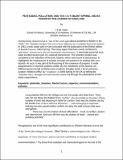Files in this item
Pesticides, pollution and the UK's silent spring, 1963-64 : Poison in the garden of England
Item metadata
| dc.contributor.author | Clark, J. F. M. | |
| dc.date.accessioned | 2018-02-16T00:33:16Z | |
| dc.date.available | 2018-02-16T00:33:16Z | |
| dc.date.issued | 2017-09-20 | |
| dc.identifier | 249053448 | |
| dc.identifier | f75d98f2-fc0d-4770-9353-018c42a073c1 | |
| dc.identifier | 85026657469 | |
| dc.identifier | 000407221600004 | |
| dc.identifier.citation | Clark , J F M 2017 , ' Pesticides, pollution and the UK's silent spring, 1963-64 : Poison in the garden of England ' , Notes and Records of the Royal Society , vol. 71 , no. 3 , 297 , pp. 297-327 . https://doi.org/10.1098/rsnr.2016.0040 | en |
| dc.identifier.issn | 0035-9149 | |
| dc.identifier.other | ORCID: /0000-0002-7948-9229/work/60427915 | |
| dc.identifier.uri | https://hdl.handle.net/10023/12729 | |
| dc.description | Funding for much of the research for this essay was obtained from a Carnegie Trust Research Grant. | en |
| dc.description.abstract | Despite being characterized as ‘one of the worst agricultural accidents in Britain in the 1960s’, the ‘Smarden incident’ has never been subjected to a complete historical analysis. In 1963, a toxic waste spill in Kent coincided with the publication of the British edition of Rachel Carson's Silent spring. This essay argues that these events combined to ‘galvanize’ nascent toxic and environmental consciousness. A seemingly parochial toxic waste incident became part of a national phenomenon. The Smarden incident was considered to be indicative of the toxic hazards that were born of technocracy. It highlighted the inadequacies of existent concepts and practices for dealing with such hazards. As such, it was part of the fracturing of the consensus of progress: it made disagreements in expertise publicly visible. By the completion of the episode, 10 different governmental ministries were involved. Douglas Good, a local veterinary surgeon, helped to effect the ‘reception’ of Silent spring in the UK by telling the ‘Smarden story’ through local and national media and through the publications of anti-statist organizations. | |
| dc.format.extent | 31 | |
| dc.format.extent | 535476 | |
| dc.language.iso | eng | |
| dc.relation.ispartof | Notes and Records of the Royal Society | en |
| dc.subject | Pesticides | en |
| dc.subject | Smarden | en |
| dc.subject | Rachel Carson | en |
| dc.subject | Expertise | en |
| dc.subject | Environmentalism | en |
| dc.subject | Pollution | en |
| dc.subject | DA Great Britain | en |
| dc.subject | GE Environmental Sciences | en |
| dc.subject | S Agriculture (General) | en |
| dc.subject | T-NDAS | en |
| dc.subject | BDC | en |
| dc.subject | R2C | en |
| dc.subject.lcc | DA | en |
| dc.subject.lcc | GE | en |
| dc.subject.lcc | S1 | en |
| dc.title | Pesticides, pollution and the UK's silent spring, 1963-64 : Poison in the garden of England | en |
| dc.type | Journal article | en |
| dc.contributor.sponsor | Carnegie Trust | en |
| dc.contributor.institution | University of St Andrews. School of History | en |
| dc.contributor.institution | University of St Andrews. Centre for Ancient Environmental Studies | en |
| dc.contributor.institution | University of St Andrews. St Andrews Sustainability Institute | en |
| dc.identifier.doi | 10.1098/rsnr.2016.0040 | |
| dc.description.status | Peer reviewed | en |
| dc.date.embargoedUntil | 2018-02-15 | |
| dc.identifier.grantnumber | en |
This item appears in the following Collection(s)
Items in the St Andrews Research Repository are protected by copyright, with all rights reserved, unless otherwise indicated.

